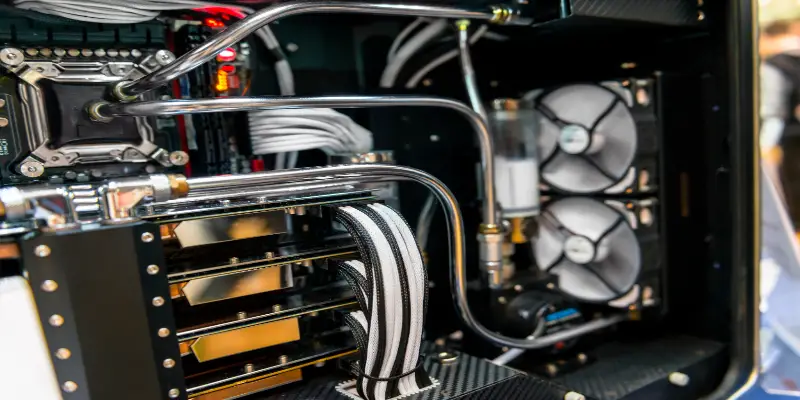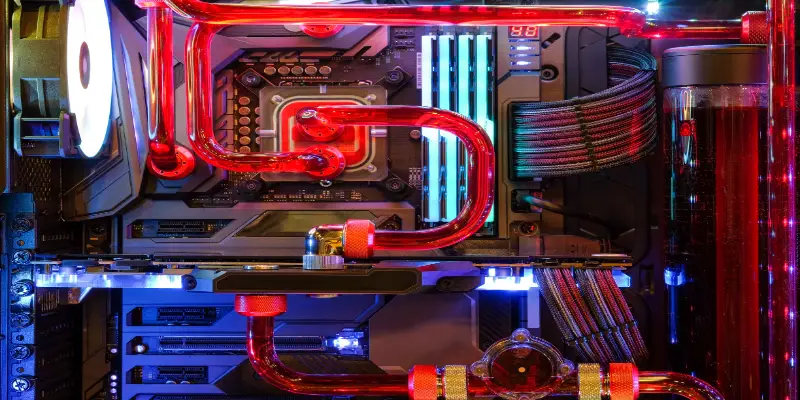Disclaimer: This post may contain affiliate links, meaning we get a small commission if you make a purchase through our links, at no cost to you. For more information, please visit our Disclaimer Page.
Water cooling is a great way to ensure that your computer is running at its best performance. However, some people question how much noise it produces.
Water cooling is noisy to a small degree, but if you have bubbles trapped in the system then it will make more noise than normal. This can happen from the movement of the device and can be solved by holding the radiator in your system above the processor to allow the bubbles to dissipate.
Table of Contents
Is Water Cooling Noisy?
Water cooling is not necessarily noisy, but it is not completely quiet either. There are two options of cooling available for a PC, water cooling and fan cooling. Both are methods used to lower heat temperatures from electrical devices, usually for Desktop Computers.
As the technology for computers has increased significantly over the years, so has the demand for better cooling systems. Processor speeds have particularly enhanced over the last few years, meaning that the heat they can now give off is extremely high.
Your computer mustn’t overheat as this can cause permanent damage to the components of your device. In extreme cases of overheating, your computer can set fire, posing a massive risk to you and your household.
This is why all manufacturing companies of electrical devices are continually developing new cooling software. As well as considering the efficiency of cooling systems, noise reduction is also a priority.
These cooling systems can make a lot of noise waste, which is problematic for the consumer.
Water cooling systems are the best systems at keeping up with the high heat waste from devices, as they can conduct heat up to 30X faster than air can.
Water cooling systems distribute the heat away from the device, allowing your computer desktop to keep functioning in the way that it should.
Water cooling systems are not noisy, but they do make some dripping or humming sounds depending on the type of model cooling system that you are using. It also depends on the type of device you are using, as heavy gamer PCs will exert a lot more heat, meaning the cooling system is working harder and therefore making more noise.
If you are using a simple desktop computer for everyday tasks such as emailing and surfing the web, the heat waste your device is producing will be minuscule and so you will not hear the cooling system as much.
Water cooling was designed to be a system that is more efficient in terms of heat distribution and to produce less noise waste in the process.
With that, one of the main reasons for water cooling noise is air trapped inside the loop. This is because it is exceedingly difficult to seal them in the factories without any air getting trapped inside. Furthermore, in the journey from the factories to the warehouses/shelves and then to your home, air bubbles will naturally form from the movement.
The air bubbles within your water cooling system will sound exactly like air bubbles moving through water. The sound will still be minute and will only irritate if you are extremely close to your water cooling system, or in a quiet room. However, you can fix this issue if it is causing you trouble.
All you will need to do is place your radiator in your system vertically with the bars running from the top. This will allow the air bubbles to move through and evaporate from the system.
You can leave the radiator like this for a few days and before your water cooling system stops making noise again.
If this has happened to you it is nothing to worry about, your cooling system is not broken or malfunctioning. Plus, this issue has a remarkably simple solution.
For more on this with a visual representation on how to fix this problem, you can click on this video posted by YouTube Channel Enderman Engineering and he will explain this in more detail for you.
Is Water Cooling Quieter Than Fan Cooling?
Water cooling is quieter than fan cooling, even if air bubbles are trapped in your water cooling systems, the noise waste is still significantly lower than with fan cooling systems. This is down to the amount of heat one water cooling system can reduce, as opposed to multiple fan cooling systems reducing the same levels of heat, but therefore doubling in noise.
Fan cooling systems were invented as the original cooling system for PCs and other electrical devices. They work by transferring heat into air particles and then removing the hot air particles from the system using a fan.
Once the fan has redirected to hot air particles, cooler air particles take the place, and the process starts all over again.
These systems worked well for older computers and processors and speeds in electrical devices were not even close to the speeds that they operate at today.
This means that the heat being produced by older computers and devices was truly small in comparison to the heat produced by computers you see today.
These smaller heat levels meant that fan cooling systems were sufficient at redirecting and distributing the heat away from the device. However, with the increased speeds and in turn heat levels, singular fan cooling systems were no longer sufficient and dispensing this heat.
Therefore, multiple fans were needed to maintain the pace of heat reduction to match these newer devices. The downside of these multiple fan cooling systems is that they are incredibly noisy. A singular fan produces some noise as it stands, however, if you double, triple, or even quadruple the fans within the system, then the noise will undoubtedly be high.
Water cooling systems are much quieter than fan systems. Even with a singular fan system, you will find that a water cooling system produces much less noise.
However, singular fan systems are no longer used in newer computers and electrical devices for the reasons stated above. Therefore, the difference in noise between water and fan cooling systems is significantly lower when using water cooling.
How Do I Reduce Water Cooling Noise?
Depending on the cause of the noise coming from your water cooling system, you can usually solve this rather simply. If the cause of the noise is from air bubbles formed in the tubes, then you can solve this simply by standing your radiator vertically.
This will allow the air bubbles to evaporate, leaving your water cooling system bubble-free.
PC components and Gaming Gear company, CORSAIR has created a video on their YouTube channel explaining how to do this with their water cooling systems. If you own one of these, then you can check out the video here.
If you do not own this exact type of water cooling system, but still need to reduce the noise, then you still may find this video useful.
Essentially, you need to ensure the radiator is above the pump, for the air bubbles to move through the system and dissipate. In some extreme cases, you may need to uninstall the radiator from the tubes and the pump and give it a shake.
This will help the bubbles to move through the system and stop making noise when your device is in use.
There are six different types of water cooling systems available on the market. The most popular water cooling systems are closed-loop systems as these are easier to manufacture and install.
It is always recommended to research the different types of water cooling systems available and check which one’s use produces less noise waste.
When you are buying your new computer/device, you may want to consider going in-store and speaking with a sales specialist about the different types of cooling systems they offer.
If noise is an issue for you, then you can mention this to them, and they can help find the best-fitted system for your needs.
Conclusion
With the expanding nature of technology, cooling systems, and noise reduction are improving yearly. There are always new designs becoming readily available to stores for all your computer and electrical needs.
Although there is not a completely silent cooling system available to date, do not disregard this as a high probability within the next few years.
As people are increasingly using electrical devices to access the digital worlds of gaming, streaming, working, digital marketing, and more, the demand for newer, better, and faster technology will continue to grow and increase with it.


